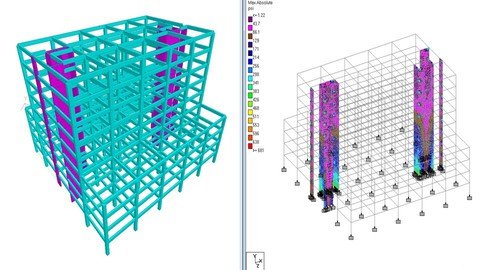
Published 5/2023
MP4 | Video: h264, 1280x720 | Audio: AAC, 44.1 KHz
Language: English | Size: 3.10 GB | Duration: 4h 56m
Use Staad pro and RCDC to design a G+5 Building
Free Download What you'll learn
Design of RCC structure
Design of G+5 RCC structure
Understand staad GUI
How to scheme a building
Requirements
Basic Understanding of structural analysis
Description
STAAD Pro is a sophisticated software program used in civil and structural engineering to analyze and design structures. It is widely used in the design and analysis of various types of structures such as buildings, bridges, towers, tunnels, stadiums, and industrial structures.The software provides a comprehensive and integrated environment for the modeling, analysis, and design of structural systems. It supports various types of analysis including linear and nonlinear static, dynamic, and modal analysis. It also supports different design codes and standards from around the world.STAAD Pro allows engineers to create 3D models of structures using various elements such as beams, columns, plates, walls, and shells. The software provides a wide range of tools for modeling and editing these elements, including graphical user interfaces and advanced scripting capabilities. Engineers can also import 3D models from other CAD software and convert them into STAAD Pro models.One of the key features of STAAD Pro is its ability to automatically generate loads and load combinations based on different design codes and standards. This saves engineers time and effort in the design process, and ensures that the structure is designed to meet the necessary safety and performance requirements.The software can also perform advanced analysis techniques such as time history analysis, response spectrum analysis, and nonlinear analysis. These techniques are particularly useful in the design of structures that are subject to dynamic loads such as earthquakes, wind, and vibrations.STAAD Pro provides a range of design checks to ensure that the structure is safe and meets the necessary design requirements. These checks include member sizing, reinforcement detailing, and material optimization. The software can also generate detailed reports that summarize the analysis and design results, providing engineers with a clear and concise overview of the project.Overall, STAAD Pro is a powerful tool for engineers to analyze and design complex structures efficiently and accurately. Its advanced modeling and analysis capabilities, combined with its comprehensive design checks and reporting features, make it an essential tool for any civil or structural engineering project.
Overview
Section 1: Introduction
Lecture 1 Introduction to staad pro connect user interface
Lecture 2 Day 2 understanding the grid system in staad
Lecture 3 Day 3 How to model beams
Lecture 4 Day 4 How to Assign properties
Lecture 5 Day 5 Analysis of a simply supported beam
Lecture 6 Day 6 Analysis of a Continuous beam
Lecture 7 Day 7 Analysis of a simply supported slab
Section 2: Scheming of building
Lecture 8 Day 8 scheming of ground floor
Lecture 9 Day 9 scheming of ground floor
Lecture 10 Day 10 scheming of first- fifth floor part 1.
Lecture 11 Day 11 scheming of first- fifth floor part 2
Lecture 12 Day 12 checking columns alignment
Lecture 13 Day 13 first to 5th floor layout
Lecture 14 Day 14 Roof layout layout.
Section 3: Modelling on STAAD pro CE
Lecture 15 Day 15 staad Ground floor modelling
Lecture 16 Day 16 staad Ground floor modelling
Lecture 17 Day 17 staad first floor modelling1.
Lecture 18 Day 18 staad first floor modelling2
Lecture 19 floor load vs plate load.
Lecture 20 Day 20 staad first floor modelling3
Lecture 21 Day 21 2nd floor column.
Section 4: Modelling on staad part 2
Lecture 22 Day 22 2nd floor beams
Lecture 23 Day 23 2nd floor beams part 2
Lecture 24 Day 24 2nd floor creation.
Lecture 25 Day 25 3rd-5th floor creation floor creation
Lecture 26 Day 26 roof floor creation
Lecture 27 Day 27 shear wall creation
Lecture 28 Day 28 shear wall creation part2
Section 5: LOADING
Lecture 29 Day 29 creating supports.
Lecture 30 Day 30 dead loads
Lecture 31 Day 31 live load
Lecture 32 Day 32 roof live load
Lecture 33 Day 33 block wall load.
Lecture 34 Day 34 missing slabs
Lecture 35 Day 35 meshing slabs
Section 6: Analysis and Post processing
Lecture 36 Day 36 Loading combo.
Lecture 37 Day 37 specifications
Lecture 38 Day 38 Reorienting beams.
Lecture 39 Day 39 analysis and post processing
Lecture 40 Day 40 analysis and post processing part 2.
Section 7: Design of structural elements
Lecture 41 Day 41 ground floor beam design
Lecture 42 Day 42 1st floor beam design
Lecture 43 Day 43 column design.
Lecture 44 Day 44 pile cap design
Beginners structural engineers
Homepage
https://www.udemy.com/course/use-staad-pro-and-rcdc-to-design-a-g5-building/
Buy Premium From My Links To Get Resumable Support,Max Speed & Support Me
Links are Interchangeable - Single Extraction
Comments

